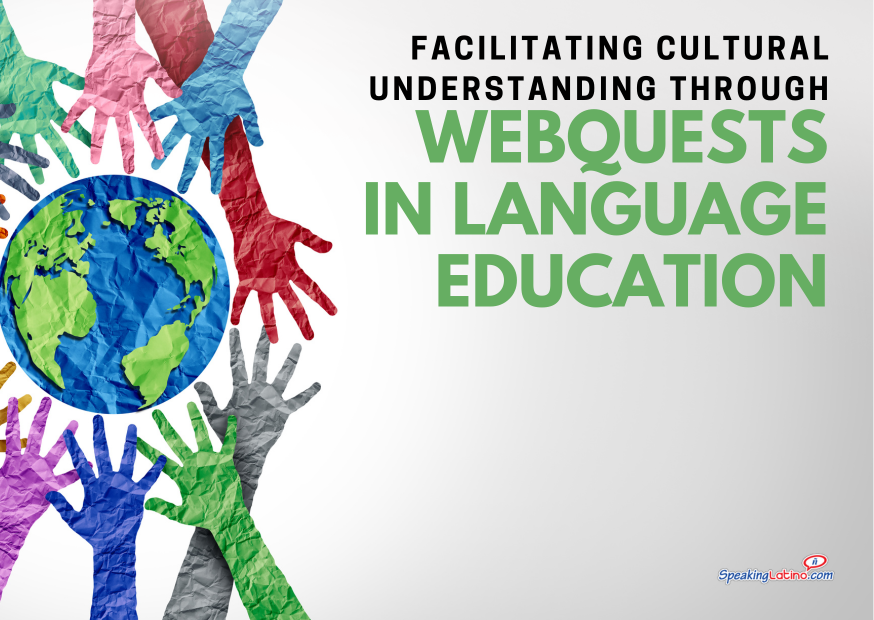
The content of this article is based on the presentation, Teaching Culture with Webquests by Jessica Hall, which was part of the World Language Teacher Summit.
Cultural Education and Language Learning
Teaching culture is an essential aspect of language education, as it provides students with valuable insights into the world and enriches their understanding of different societies. This article will explore the benefits of using WebQuests to teach culture, discussing the reasons for incorporating this approach, how to create effective WebQuests, and strategies for implementing them in the classroom.
WebQuests enable students to delve into a variety of cultural topics, from food and traditions to history and art, using the vast resources available on the internet. By immersing themselves in these topics, students can develop a deeper appreciation for diverse cultures while honing their language skills.
Why Use WebQuests to Teach Culture?
WebQuests offer an engaging and interactive way to explore culture. As students engage with these online resources, they can immerse themselves in pictures, videos, and information, replicating a virtual cultural experience. The internet allows for a level of immersion and exploration that traditional resources often cannot match. Utilizing WebQuests in the classroom requires access to computers or tablets and the internet for each student, which can present challenges in some educational settings. However, for those with access, WebQuests provide an unparalleled opportunity for students to engage with and learn about different cultures.Notably, WebQuests offer a curated experience, as educators can pre-select websites to direct students to, ensuring the quality and appropriateness of the content. By leveraging trusted sources, educators can guide students toward valuable cultural insights while avoiding potential distractions or inappropriate material. This level of oversight provides a sense of security for educators, allowing them to effectively curate the learning experience.
Creating Effective WebQuests
Developing an effective WebQuest involves several critical steps, beginning with selecting a topic that will captivate the students’ interest and offer opportunities for comparison and reflection. For example, a WebQuest could delve into the traditions, geography, history, culinary delights, and tourist attractions of a Spanish-speaking country. Such a focused exploration allows students to gain a comprehensive understanding of the cultural aspects under study.When choosing the websites to direct students to, specific criteria should be applied. The selected sources should offer large text and short paragraphs to facilitate reading and comprehension. Additionally, the inclusion of pictures and videos enhances the learning experience, providing visual context to complement the textual information. By carefully curating the websites, educators can ensure that students are exposed to engaging and informative content that aligns with the learning objectives.Another crucial aspect of creating effective WebQuests is crafting meaningful and well-structured questions. The questions should be designed to guide students to the relevant information on the websites, enabling them to engage with the cultural content in a purposeful manner. Providing specific guidance, such as indicating where particular information can be found, helps students navigate the online resources effectively, reducing frustration and enhancing the learning experience.

Through WebQuests students can learn about a lot of different cultures or topics
Implementing WebQuests in the Classroom
The successful implementation of WebQuests requires careful planning and consideration of logistical details. For instance, if students are required to access the WebQuest in a computer lab, clear procedures for transitioning to that space should be established. Educators need to communicate these procedures effectively to ensure a smooth and orderly experience. In cases where students are utilizing their own devices, clear instructions regarding access to the WebQuest and any necessary login information should be provided.Furthermore, educators should consider the potential use of WebQuests as part of their sub plan. Developing WebQuests in English provides an excellent alternative instructional resource for substitutes, as the content remains accessible and relevant irrespective of the educator’s language proficiency. This approach can offer a seamless transition for students and ensures continuity in their learning experience.Additionally, it is important to incorporate open-ended questions within the WebQuests, encouraging students to compare and contrast cultural elements, express their opinions, and relate the content to their own lives. This fosters critical thinking and introspection, allowing students to engage with the cultural material on a personal level. Furthermore, providing opportunities for students to discuss and share their findings can enrich the learning experience, as it promotes a deeper understanding of the cultural content through peer interaction.
FAQs about WebQuests
What are the benefits of using WebQuests to teach culture topics?
Using WebQuests to teach culture topics offers several benefits:
- Engaging Learning Experience: WebQuests provide an interactive and engaging way for students to explore and learn about different cultures. Students can immerse themselves in the culture through multimedia elements like pictures and videos.
- Access to Diverse Cultures: WebQuests allow students to learn about a variety of cultures and topics chosen by the teacher. This exposure helps broaden students’ understanding and appreciation of different cultural practices and traditions.
- Integration of Technology: WebQuests leverage technology by utilizing the internet to access information about cultures. This integration enhances students’ digital literacy skills and familiarity with online resources.
- Customization and Flexibility: Teachers can tailor WebQuests to suit their specific learning objectives and the interests of their students. This customization allows for a more personalized and relevant cultural learning experience.
- Encourages Critical Thinking: By posing predetermined questions for students to answer based on the provided websites, WebQuests promote critical thinking skills as students analyze and synthesize information about different cultures.
Overall, using WebQuests to teach culture topics can enhance students’ cultural awareness, critical thinking abilities, and engagement in the learning process.
How can students be engaged in cultural learning through WebQuests?
Students can be engaged in cultural learning through WebQuests in the following ways:
- Multimedia Elements: Incorporate multimedia elements such as pictures and videos related to the culture being studied. Visual aids can capture students’ attention and enhance their understanding of cultural practices and traditions.
- Interactive Tasks: Design interactive tasks within the WebQuest that require students to actively engage with the content. This could include answering questions, completing activities, or participating in discussions related to the culture.
- Real-World Relevance: Connect the cultural learning to students’ real-world experiences and interests. Encourage them to relate the cultural information they learn to their own lives, traditions, and perspectives.
- Choice and Autonomy: Provide students with choices within the WebQuest, such as selecting topics of interest or deciding how to present their findings. Allowing autonomy can increase student engagement and motivation in the learning process.
- Collaborative Learning: Foster collaboration among students by incorporating group tasks or discussions within the WebQuest. Encouraging peer interaction can deepen students’ understanding of cultural concepts and promote teamwork.
- Gamification Elements: Integrate gamification elements, such as challenges, rewards, or interactive quizzes, to make the cultural learning experience more engaging and enjoyable for students.
By implementing these strategies, educators can create WebQuests that actively engage students in cultural learning, making the experience more meaningful, interactive, and memorable.

WebQuests can actively engage students in cultural learning, making the experience more meaningful, interactive, and memorable
What practical steps can be taken to create effective WebQuests for the language classroom?
To create effective WebQuests for the language classroom, consider the following practical steps:
- Select a Relevant Topic: Choose a culturally rich and engaging topic that aligns with the language curriculum and learning objectives. Ensure the topic is interesting and meaningful for students to explore.
- Define Learning Goals: Clearly outline the learning goals and objectives of the WebQuest. Identify the specific cultural knowledge or language skills students should acquire through the activity.
- Design Engaging Tasks: Develop interactive and stimulating tasks that require students to explore, analyze, and reflect on cultural information. Incorporate multimedia elements, interactive questions, and real-world applications to enhance student engagement.
- Provide Clear Instructions: Clearly communicate the instructions, expectations, and guidelines for completing the WebQuest. Ensure that students understand the tasks they need to accomplish and how to navigate the online resources provided.
- Curate Reliable Resources: Select reputable and reliable online resources that offer accurate information about the culture being studied. Verify that the websites are accessible and appropriate for student use.
- Ensure Accessibility: Check that the online resources and links provided in the WebQuest are accessible to all students, especially if there are restrictions or blocks in place by the school district. Test the links to ensure they are clickable and lead to the intended content.
- Encourage Reflection and Application: Include opportunities for students to reflect on their cultural learning and apply their knowledge in practical ways. Foster critical thinking, analysis, and connections to their own experiences.
- Incorporate Differentiation: Consider the diverse learning needs and preferences of students when designing the WebQuest. Provide options for differentiation, such as varying levels of difficulty, alternative tasks, or collaborative opportunities.
By following these practical steps, educators can create engaging and effective WebQuests that promote cultural understanding, language proficiency, and student engagement in the language classroom.
WebQuests: A Gateway to Cultural Enrichment in Modern Education
WebQuests offer a valuable avenue for educators to engage students in the exploration of various cultural topics. By leveraging the resources available on the internet, educators can create enriching and immersive learning experiences that foster greater cultural awareness and understanding. Through careful curation of websites, the crafting of thoughtful questions, and effective implementation strategies, WebQuests can become a central component of language and cultural education.As technology continues to play a significant role in education, the integration of WebQuests provides a modern and dynamic approach to teaching culture. With the potential to enhance language skills, promote cultural appreciation, and encourage critical thinking, WebQuests serve as a powerful tool for educators seeking to create meaningful and engaging learning experiences for their students.By embracing the benefits of WebQuests and employing them effectively, educators can empower students to explore the diverse tapestry of global cultures, fostering in them a broad worldview and a deep appreciation for the richness of human experience.